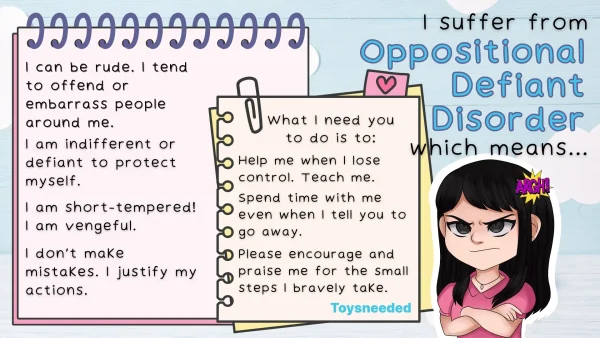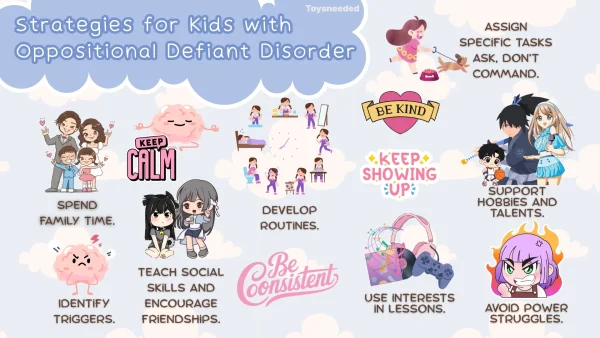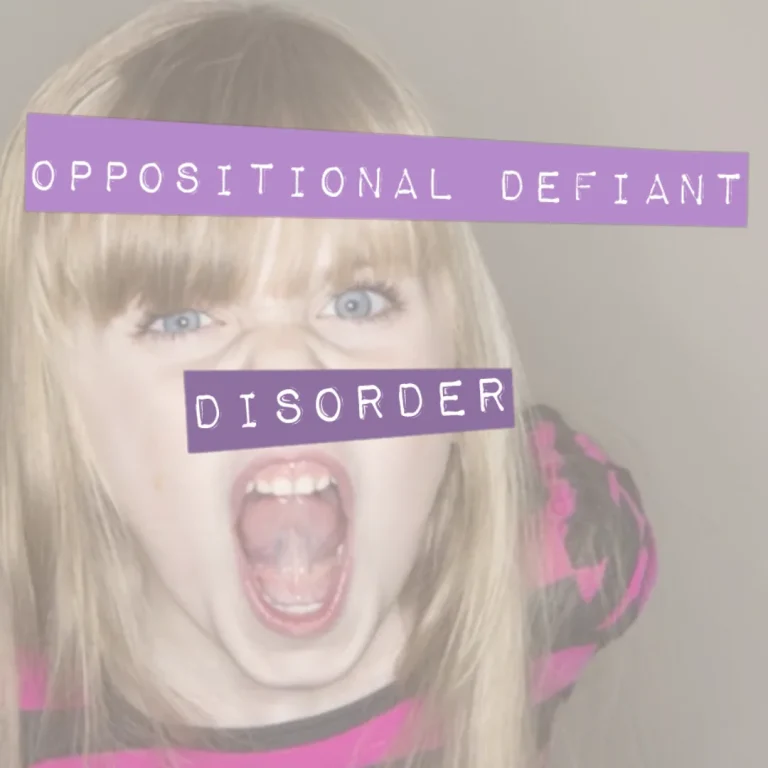The Bible says children are angels here on earth, even though their attitude sometimes feels anything but!
But if your child’s sassy streak has evolved into an ongoing pattern of extreme defiant behaviors—meltdowns, disrespectful retorts, refusal to own mistakes and follow rules—you might be dealing with Oppositional Defiant Disorder (ODD).
Children with ODD could test the patience of even someone like Mama Mary. Their angry attitude and vindictive behavior will leave you feeling drained and nearly insane.
Thankfully, with the help of a mental health professional, evidence-based strategies can straighten up ODD behaviors and restore harmony to your family.
So read on, dear parents. A silver lining awaits!
How Different Are Children Diagnosed with ODD?

Acts of defiance are normal among younger children. Kids test limits to understand their social roles better and express their growing independence. As parents/guardians, it’s our duty to discipline and guide kids toward positive behaviors.
But for children diagnosed with ODD, stubbornness and aggressive behaviors aren’t just a phase. Always itching for a debate, these little rebels challenge authority figures without fear or shame.
But here’s the kicker: children with ODD use conflict as a way to cope with negative emotions. Arguing with authority figures somehow makes them feel powerful and in control, offering a quick fix for the emotional chaos they haven’t quite figured out how to process.
Impact of ODD on a Child’s Behavior, Mental Health, Academic Performance, and Family Dynamics
Oppositional Defiant Disorder (ODD) can profoundly affect nearly every aspect of a child’s life, as well as their family members.
🏡💣🤯 Tumultuous household. The home becomes an emotional battleground, where simple tasks can escalate into power struggles. These conflicts place immense stress on family life, especially on the child’s parents.
You must stay strong and learn how to handle emotions amidst the chaos. Establish clear boundaries and show who’s in charge. Otherwise, you risk letting these power struggles continue unchecked.
🏫🎓💔 Low academic achievement and limited social connections. School-age children with ODD often reject structure, which leads to poor academic performance and frequent disciplinary issues. Additionally, their disruptive behavior undermines classroom order. Their angry and irritable moods further hinder their ability to form healthy friendships with other children.
📉💼👮♂️ Worsening difficulties extending into adulthood. Furthermore, the effects of Oppositional Defiant Disorder go beyond behavior. Children with ODD are at a higher risk of developing other mental health disorders, including anxiety disorders and low self-esteem.
Most concerning, these behavioral problems don’t fade with age. Studies show that many children with untreated ODD are more likely to develop conduct disorder in adolescence and carry it into adulthood, which involves more severe antisocial behavior, aggression, and disregard for societal norms.
Why Many Children Struggle with Oppositional Defiant Disorder

It’s important to remember that this disorder isn’t the result of “bad parenting” or one single cause.
Child’s Parents (Genetics)
Children may have a genetic predisposition to Oppositional Defiant Disorder (ODD) if there’s a family history of behavioral problems, mental illnesses, or substance abuse.
Parenting Styles
Parenting methods greatly influence the development of disruptive behavior disorders like ODD. Inconsistent discipline and a lack of structure all contribute to a child’s oppositional behavior.
Parents who follow traditional beliefs or lack a clear understanding of the real meaning of discipline might unintentionally resort to harsh punishments, which can worsen the behavior rather than correct it.
Environmental Factors and Living Arrangements
Stressful or unstable home environments—marked by constant tension, violence, or lack of safety—can trigger oppositional behaviors in children. Defiance often becomes a coping mechanism for kids trying to regain a sense of control or express emotional distress.
Blended family dynamics, where children alternate between parents, may also contribute to Oppositional Defiant Disorder (ODD). Frequent changes in routines and inconsistent discipline create confusion and instability, increasing the risk of defiant behavior.
Children caught between conflicting households may feel emotionally torn, fostering resentment and a tendency to rebel against authority figures.
Dysregulated Emotional Intelligence
This refers to difficulty in recognizing, understanding, and managing emotions effectively. Children with ODD often struggle to cope with anger, disappointment, and frustration, which can lead to impulsive reactions, outbursts, or defiant behaviors.
Differentiating Between Oppositional Defiant Disorder and Other Mental Health Conditions (Anxiety Disorders, Attention Deficit Hyperactivity Disorder, Autism)

Oppositional Defiant Disorder (ODD) shares some symptoms with other mental health conditions but focuses on defiance, irritability, and hostility toward authority figures.
Unlike anxiety disorders, which center around excessive worry and fear, children with ODD primarily express anger and defiance.
Compared to Attention Deficit Hyperactivity Disorder (ADHD), which involves impulsivity, hyperactivity, and inattention, Oppositional Defiant Disorder (ODD) is more about challenging authority.
In contrast to autism, where meltdowns often result from difficulties in communication and sensory processing, children with ODD deliberately engage in defiant behaviors to oppose rules, requests, or expectations.
Their outbursts are driven by a need to assert control and express frustration with authority figures. These tantrums are less about being overwhelmed by emotions and more about testing boundaries and defying limits.
Early Intervention Treats ODD Symptoms and Improves a Child’s Behavior

Oppositional Defiant Disorder (ODD) is a mental health condition that affects 3.3% of children and adolescents, according to the American Psychiatric Association. Early intervention is crucial in managing oppositional and defiant behaviors before they worsen or become deeply ingrained.
Start with a Child Psychologist/Adolescent Psychiatrist
Seek a qualified mental health professional, so you can obtain an official diagnosis based on the Diagnostic and Statistical Manual (DSM-5). Only a mental health provider can address the root cause of ODD symptoms and create an individualized treatment plan for your child.
Incorporate Parent Management Training (PMT) and Family Therapy
Parent Management Training teaches parents practical skills to manage their child’s defiant behaviors. You will learn techniques for reinforcing positive behaviors and minimizing negative ones.
At the same time, family therapy fosters open communication and helps all family members understand and manage ODD effectively. This creates a supportive and cohesive home environment.
All Family Members Should Practice Consistent, Positive Discipline at Home
All family members must cultivate self-discipline and serve as exemplary role models. Parents must establish clear expectations, reward positive behaviors, and implement fail-proof consequences for unwanted behaviors. This approach preserves structure and stability, ensuring a consistent environment where children understand boundaries and the importance of respect.
Support Emotional Growth and Self-Esteem
Ultimately, foster your child’s emotional growth and self-esteem by encouraging self-awareness, emotional regulation, and resilience. Help your child express their feelings constructively and always praise their efforts.
Building emotional intelligence and self-worth reduces frustration and the risk of negative behaviors. Most importantly, it helps children with ODD develop healthier coping strategies.

